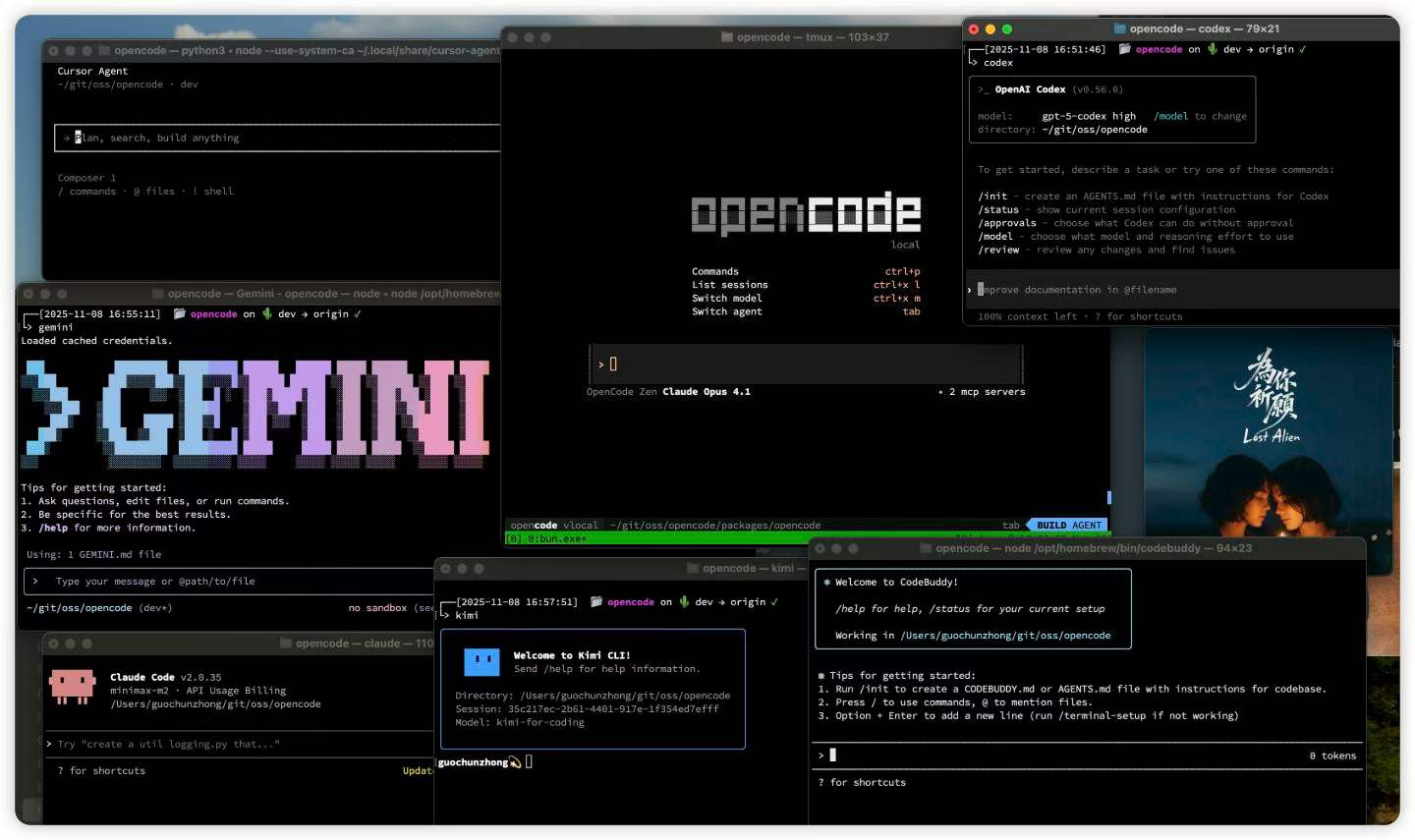Make pnpm install success on the MacOS machine already install libvips via brew.
|
Make pnpm install success on the MacOS machine already install libvips via brew.
|
|
After running any auto-format on a repository, git blame becomes almost useless because every line is “last touched” by the formatting commit.
Git has a built-in solution: tell git blame to ignore specific commits.
.git-blame-ignore-revs in root repo.
|
|
Now when you run git blame, those commits will be skipped and you can see the real history again.
.git-blame-ignore-revs into your repo so GitHub (and other developers) can use the same ignore list..git-blame-ignore-revs automatically in the web UI, so you’ll get the same “clean blame” there too.It's very similar post like deploy to Rocky Linux 8, but this time we using a opencode project, this Next.JS enable you add a login via sso to an existing dify app, which is must need for a enterprise env.
|
and make sure you can login via ssh sql_chat@your_server
|
|
I planned a book, 7 Coding Agents in 7 Weeks. In the end, I only had two days—and this Chinese article was all I could manage.

声明:以下测评内容没有经过任何 AI 的润色或者重写,所以你发现了 AI 味道,那一定是我被影响了,欢迎指出拯救我的 AI 味,如同我的老登味一样
时光飞快,日月如梭,转眼到了中年,到了看到任何科技都是异端的年纪,但是谁会拒绝拥有一个言出法随,言听计从的智能体呢?如果一个不行,那就再来一个,于是,一个接着一个,我一不小心拥有了 7 个,那么就不妨来个个人风格横向测评吧!
本次测评纯属我个人行为,无任何一拍即合的商业合作。
本次测评使用的方法是不严谨的,仅供我个人记录回忆以及和朋友们的交流使用,您可以看作这是一次娱乐。
由于我们是测试比较 AI coding 智能体,而不是 LLM 大模型,所以为了尽量避免苹果和梨放在一起比较的尴尬,我还是控制了一下测试变量,如果硬要说我这个测试方式还是拿苹果和梨放在一起比较,那您一定是对的,只要定语加的足够多,我相信您的结论。但我这篇文章是没有定语的,测评的是全球范围的,不限制商业或者开源,但是受到一些合理工程成本限制的 AI Agent 们的能力。
测试方式是日常开发使用场景,介绍一下背景,我是 15 年的 Rails 程序员,15 年的.Net 程序员,毕业在外企工作了 7 年,互联网公司 5 年,建筑设计公司 6 年。日常使用场景在被测试的 coding agent 上使用的方式都完全相同,coding agent 能接触到的工具就是他们自己的工具,使用的模型总是使用 coding agent 推荐的。如果默认的模型做出的结果不好,我会选择更加强力的模型再试一次。
所有测试都是在本机上测试,环境是 MacOS 15.7.2,homebrew 安装的开发工具集,命令行工具也是系统自带,如果 coding agent 有内置的工具,比如 kimi-cli 就会自动安装 ripgrep,那么 kimi-cli 就用的是它自带的工具。
所有 coding agent 的配置选项都是默认,如果 coding agent 有能力搜索 web,那它就可以搜索 web,如果 coding agent 有做 RAG,那就允许,不会做任何的限制。
所有 coding agent 的测试都只考虑结果是否正确,不会特别考察 agent 的运行速度。
另外关于测试题目,因为都是我的日常开发场景,所以必然有难有容易,也很难特别考虑区分度,我也不会在测评最后打分,因为我不想排序,作为成年人,我可能会排出掉 2~3 个 coding agent 后,余下的我都要。这个策略是现实中非常合理的,如果你日常大量使用 coding agent 的话,应该和我一样感到一个 coding agent 是肯定不够用的,但是如果直接买 200 美刀的 ultra 版本,显然也非常吃亏。
目前我的常驻付费 coding agent 分别是 cursor 和 openai codex,opencode 也是我日常天天使用的,opencode 的付费是按照 token 用量,对于按照 token 用量的,我一般会一直保留使用,但是对于订阅的,我还是会评估,并进行成本优化。
模型 auto,3 次 greps, 2 次 files,准确指出代码行:packages/opencode/src/auth/index.ts:35-38,实测~/.local/share/opencode/auth.json找到配置 key,但是提到的 MacOS 路径不存在,基本回答正确。
模型 big-pickle(免费),1 次 grep,2 次 files,回答“Opencode stores credentials in ~/.local/share/opencode/auth.json (or the equivalent XDG data directory on your system). The file is created with 0o600 permissions for security.”,完全准确。
模型 gpt-5-codex high,直接读 AGENTS.md 后,回答“OpenCode never stores credentials in the repo—secrets are pulled from environment variables that sst.config.ts consumes, and .env* (or any other credential-bearing files) are kept out of version control entirely.”,回答错误。
由于是 OpenAI 的最强模型,我不太相信这个结果,又做了一次实验,相同。猜测是 AGENTS.md 中的 Security & Configuration Tips,提到了 sst.config.ts,干扰了祂。
···
Secrets load via environment variables consumed inside sst.config.ts, so never commit .env*, credentials, or generated logs/. Execute binaries through bin/opencode or the install script so patched dependencies in /patches remain applied. When adding fixtures or docs, redact user-specific paths (prefer .opencode/ references) and strip identifiers from captured sessions before committing.
···
删除上述 AGENTS.md 文件内容后,经过 3 次 serach,2 次 List,1 次 Read 后,得到正确答案。最终回答准确,但是应该无法得分。
模型 gemini-2.5-pro,触发了 Codebase Investigator Agent 后,由子 agent 找到具体位置,但是主 Agent 仍然提到了 ~/Library/Application Support/opencode/auth.json,这个Cursor一样犯的错误,估计是XDG Base Directory Specification 这个关键词导致的干扰,但是回答应该还是认为基本准确。
模型 minimax-m2,触发了 5 次 Search,5 次 Read 后,回答非常准确且详尽,仍然提到了不存在的 MacOS 路径,甚至有点用力过猛的给出了 project level 的位置。很卖力,能得分。
模型 kimi-for-coding,1 次 Grep,4 次 ReadFile,4 次 Bash 调用后,甚至直接在屏幕上打出了我的 OpenCoce Zen token,不仅准确,而且无所顾及,得分,以后做啥黑客的工作还得是国产模型!
模型 auto,2 次 Search,4 次 Read,给出正确答案,中规中矩,得分。
模型 auto,一路中文推理后,修改正确,甚至还告诉我 nature_id(10 表示单位,20 表示个人)
模型 big-pickle(免费),修改正确,但是会去掉几行无伤大雅的代码,可能这个模型还是有自己的品味。
模型 gpt-5-codex high,7 次 Search,3 次 Read 后,修改正确。
模型 gemini-2.5-pro,修改正确,但是修改甚至会跑 test,但是由于这个项目 test 是挂的,所以……,无论如何还是正确。
模型 minimax-m2,7 次 Search,4 次 Read 后,修改正确。
模型 kimi-for-coding,修改正确,还告诉我 nature_id(10 表示单位,20 表示个人),甚至我都没开 thinking 模式。
模型 auto (GLM 4.6) ,修改正确。
After evaluating package managers for our Rails project, I decide migrated from Yarn to pnpm for stricter, faster, and more disk‑efficient installs.
This guide is organized into four parts so you can adopt pnpm in the right order.
And the key reason: yarn is not doing any release in past two years and META just lay-off huge people recently.
|
|
|
|
|
pnpm-workspace.yaml in a monorepo:
|
|
|
bin/pnpm wrapper so Rails tasks can call pnpm consistently:
|
Make it executable: chmod +x bin/pnpm.
bin/yarn to pnpm (update existing file):
|
|
|
Create lib/capistrano/tasks/pnpm.rake:
|
And in config/deploy.rb:
|
|
Keep this for last. After local migration is green, update pipelines.
|
|
|
Enjoy faster, stricter, and much leaner pnpm!
Like the previous years 2022 / 2023 / 2024, here is my current subscription list. The first number is RMB per month.
So totally 773 RMB per month to pay. In the previous year it was 480 RMB, so 61% higher compared to 2024.
xcode-select --install) or [Xcode]Go oracle site and download:
|
|
|
|
|
|
|
|
|
|
Open cursor, goto port tab to create one.
If meet error goto '/Applications/Cursor.app/Contents/Resources/app/bin' and rename cursor-tunnel to code-tunnel.